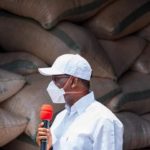|
Getting your Trinity Audio player ready...
|
Nigerians to accelerate economic diversification due to increasing
revenue shortfalls from crude oil and its derivatives occasioned by
COVID-19 global lockdown.
Board Chairman of the foundation, Dr Chiwuike Uba, said in a statement
on Thursday in Enugu that: “If there is lesson Nigeria can learn from
economic effects of COVID-19 pandemic and its attendant economic
implications, was to look beyond oil.’’
Uba, who is also a developmental economists and governance expert,
advised the federal and state governments to commence full-scaled,
all-directed and immediate diversification of the economy.
He said that, whereas the changes in oil production may lead to a
marginal increase in the global oil price, the market would experience
a glut almost immediately, due to the continuing decline in oil demand
due to global lockdown.
He added that, though the 9.7 million bpd cut would in short-term,
help the market not to fill international storage facility, which is
about 75 per cent filled, the current size of oversupply and
additional oil supply would throw back the market into its state
before cut in oil production.
“According to analysts from Goldman Sachs, the Coronavirus crisis will
slash demand by 19m bpd in April and May.
“The forecasted figure is way too big compared to the 9.7m bpd agreed
as oil production cut; hence, too little and too late to prevent a
decline in prices in the coming weeks as storage capacity becomes
saturated.
“There is huge doubt if the cuts would be enough to compensate for a
collapse in demand expected to be at least twice the size of the OPEC+
supply reductions.
“Truthfully, the agreed global cut of about 10 per cent in oil
production will not offset the recent huge drop in demand occasioned
by COVID-19 pandemic.
“More so, American oil producers may not cooperate with this cut as it
would amount to controlling prices, which would amount to violating
the competition law in the US. The USA is currently the world’s
biggest crude producer.
“According to history, previous oil production cut deals were
typically violated by oil producers a few weeks after the commencement
of implementation. Mexico already disagreed with the quota allocated
to the country and instead opted to reduce the country’s production by
100,000 bpd.
“Also given that the effective date for the implementation of the deal
is May 1, countries with high production capacity such as Saudi
Arabia, within the next few days will continue to line up tankers –
conveniently. Until May 1, such countries would have the spigots wide
open’’.
Uba, however, said that the new production cut deal may not benefit
Nigeria in any way; adding that the expected improvement in the oil
price would be minimal and short-lived as a result of the reasons I
outlined earlier.
He said: “Do not forget that Nigeria is already producing below its
production capacity for a long time now; hence, affected by both
production quantity and price.
“Even when Nigeria benefits from an across revenue from the global
production cut, the would-be revenue may end up being shared by the
national and sub-national governments without real plans for
investment to jumpstart the dying economy.
“The demand for oil will not improve in the short term as a result of
lockdowns and shutdowns across the world.
“In addition to the closure of manufacturing and service companies,
the weather across America and Europe is getting warmer; hence,
reducing the demand for gas.
“Therefore, it has even become more urgent for Nigeria to begin to
think about Nigeria without oil.’’
According to him, instead of deploying all the money appropriated for
COVID-19 for palliatives, it is important to channel some of the money
to an investment in massive productive infrastructure across Nigeria.
He noted that the funds proposed to employ 774,000 people to sweep
road till December 2020 should be used to building cottage industries
and/or invested in agriculture.
Uba said that this would not only provide jobs for people in a
sustainable way, but will also add to the production and revenue of
the nation.
“The US $150m withdrawn from the Sovereign Wealth Fund (SWF) to
augment the monthly sharing by the governments should have been
appropriately invested in the social sectors. The big question is what
would happen when we deplete all the savings,’’ he said.
Uba stressed that it was time to start making the right investments,
if not, medium and long term implications of COVID-19 on Nigerians
would be so devastating; adding: “We must reduce wastages and
frivolities associated with current governance structure and
systems’’.
“Obviously, that is the most veritable way out at this point given the
much that has occurred, the demand destruction, too much debt-making
and destruction, high unemployment, poverty level and high fiscal
deficit,’’ he said.




